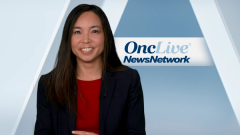
Challenges in Treating AML Upon First Remission
Expert perspectives on some of the challenges faced in managing the treatment of patients with AML upon first remission.
Episodes in this series

This is a synopsis of an Insights series featuring Catherine E. Lai, MD, MPH, of the University of Pennsylvania.
Dr. Catherine E. Lai discussed the major challenge of treating acute myeloid leukemia (AML) patients in first remission - the high risk of relapse even for favorable risk patients treated with chemotherapy alone. Preventing relapse is critical, but minimal residual disease (MRD) testing lacks standardization, requiring individualized approaches with flow cytometry, PCR, or NGS platforms. Frequent monitoring via MRD testing and blood counts aims to detect relapse early and start therapy before blast counts are too high, improving remission rates and preventing complications.
When asked about new treatments on the horizon for this setting, Dr. Lai highlighted agents under investigation to target MRD. An oral abstract on the TIM3 inhibitor sabatolimab for MRD-positive patients after transplant showed improved survival. For patients ineligible for transplant, other MRD-directed therapies targeting novel molecular biomarkers or using investigational chemotherapies are being studied.
While nothing is yet FDA approved, Dr. Lai expressed encouragement by emerging data, emphasizing the need to prevent relapse and eradicate MRD in AML patients in first remission. Frequent monitoring and individualized testing are currently used to detect early relapse. But new targeted agents on the horizon may provide additional tools to treat MRD and prevent overt hematologic relapse leading to improved remission duration and survival. Continued research is critical to make progress for patients in first remission at high risk of relapse using the biomarkers of residual disease to guide pre-emptive therapy before recurrence of overt leukemia.
*Video synopsis is AI-generated and reviewed by OncLive editorial staff.







































